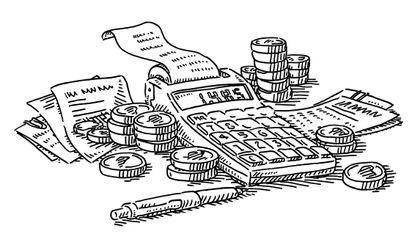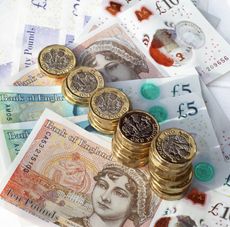5 things you might not know about credit scores
Don't underestimate the importance of your credit score - swat up on these often forgotten facts


Your credit score is incredibly important – it has a huge impact on whether you could get a loan or mortgage, and having a good record can allow you to access some of the more tantalising credit card offers on the market.
But despite this, it’s remarkable how little we often know about our own scores. In fact, according to credit agency Experian, seven in 10 people who have been turned down for credit didn’t investigate why.
Understanding and improving your credit history is the best way to prevent being turned down again, so read on for some things which you might not know about your own credit-worthiness…
1. There’s no such thing as a credit blacklist…
The idea that there is a ‘list’ which lenders share containing the details of unfavourable candidates for credit is a myth. Every lender has its own criteria, which it doesn’t share with the public.
However, there are various universal factors which will determine whether you’re a good or bad prospect, wherever you go.
“At its simplest, lenders want customers who will repay what they borrow,” said James Jones, credit expert at Experian. “So anything that suggests otherwise could negatively impact how they score your application. The key things are therefore defaults, serious arrears, county court judgements, missed payments and bankruptcy. Not being on the electoral roll or contradictory address information can be a cause for concern, as identity verification is a key fraud prevention measure.”
2. …But it’s easy enough to find out how you might do
You can get your statutory credit report for just £2, and from this you will be able to check that names, addresses, financial links and credit accounts are all accurate and up to date, and that you’re registered on the electoral roll.
Look After My Bills Newsletter
Get the best money-saving tips, tricks and deals sent straight to your inbox every week. Make sense of your money in partnership with The Money Edit.
It’s worth getting hold of one of these before making an application, because multiple attempts which are turned down in a short time can impact on your rating.
If you want to dig deeper and keep tabs on your score, there’s the option to sign up with a rating agency like Experian, Equifax or Callcredit. You can get a 30-day free trial, but bear in mind that you’ll have money leaving your account every month thereafter unless you cancel.
You can get an analysis of your credit report, telling you the behaviours which are bringing your credit score down, and those which are having a positive impact. Also bear in mind that, while there will be common factors taken into account, an agency’s report will not be exactly the same as a lender’s.
3. Never having debt can affect your score
Never having been exposed to debt can only be a good thing, right? It means that you’re prudent and live completely and utterly within your means, which will surely mean that a lender will view you as a cast-iron prospect?
In short, no. If you’ve never managed debts or demonstrated that you can handle making repayments, then lenders won’t be able to judge whether or not you’re a good case.
This could jeopardise your chances of getting approved for a mortgage, for example.
If you’ve found that your credit score is poor you could consider services like a credit-builder card – these are typically cards with a relatively low balance but high APR. Using such a card for your weekly petrol and then paying off the balance in full every month will add valuable positive data to your credit rating.
(MORE: Credit cards: how do they work?)
4. Lenders look at six years of credit history
The good news is that lenders tend to look at relatively recent behaviour when it comes to judging whether or not you’re a good prospect, so if you’ve been pretty solid with your repayments and management over the past few years then you should have cause for optimism.
However, there are a few other factors to consider. County court judgements, insolvency, bankruptcy and taking up of payday loans can have serious repercussions on your credit rating in the long term, whether you’ve conducted yourself well lately or not.
5. There’s plenty you can do to fix your rating
Even if you’ve had severe financial problems in the past, with several years’ positive credit management you can eventually rebuild your rating.
The first step you should consider is to take a look at your score and, if need be, correct any mistakes on there. Next, think about paying off your existing debt to around 20-25% of your credit limit. If you’ve got no history of having debt, now might be a good time to think about applying for a credit builder card.
Ensure that the full balance is paid off at the end of every month – credit-builder cards tend to have very high APRs, and have the potential to get very expensive if debt is left to mount up.
A freelance personal finance journalist.
-
 Three energy firms pay £8m in switching compensation - has your provider paid out?
Three energy firms pay £8m in switching compensation - has your provider paid out?More than 100,000 customers have received compensation after changing providers, but is now a good time to switch energy suppliers?
By Tom Higgins Published
-
 Save £300 on your supermarket shop with cashback accounts
Save £300 on your supermarket shop with cashback accountsBanks, credit card companies and cashback sites are all offering cashback on your supermarket shop, but can you use them all to max out your savings?
By Vaishali Varu Published
-
 Save £300 on your supermarket shop with cashback accounts
Save £300 on your supermarket shop with cashback accountsBanks, credit card companies and cashback sites are all offering cashback on your supermarket shop, but can you use them all to max out your savings?
By Vaishali Varu Published
-
 More than 150,000 grandparents missing out on £1,500 state pension uplift: how to claim
More than 150,000 grandparents missing out on £1,500 state pension uplift: how to claimGrandparents who provide childcare by looking after their grandchildren could be missing out on valuable state pension money worth thousands. We look at how much extra you could get and if you’re eligible
By Stephanie Baxter Published
-
 Can you reclaim bank charges?
Can you reclaim bank charges?If you’ve incurred bank charges over the years, these can add up to hundreds of pounds – but can you get your money back? We look at whether you can make a claim and how to do it
By Stephanie Baxter Published
-
 HSBC extends deadline for customers to secure bigger interest-free overdraft
HSBC extends deadline for customers to secure bigger interest-free overdraftHSBC customers now have until 10 May to increase their interest-free overdraft limit from £25 to £500. First Direct, Lloyds and Nationwide also offer similar support. We explain everything you need to know
By Katie Binns Last updated
-
 New banking hub locations revealed - is there one near you?
New banking hub locations revealed - is there one near you?The rise of banking hubs is in response to a stream of local branch closes. With more planned to launch soon, we look at what services they offer and where you can find one
By Stephanie Baxter Published
-
 April 2023 premium bond winners revealed - are you a millionaire?
April 2023 premium bond winners revealed - are you a millionaire?Two premium bond holders have won £1 million each this month and there are many other prizes for another 5,018,742 winners in April. We look at how to find out if you’ve won
By Stephanie Baxter Published
-
 Get more for your money with a stocks and shares ISA
Get more for your money with a stocks and shares ISAA stocks and shares ISA could grow your money faster than a cash ISA. But what is it exactly and who is it suitable for?
By Ruth Emery Published
-
 Help to Save scheme extended – act now for £1,200 bonus
Help to Save scheme extended – act now for £1,200 bonusThe government has extended the Help to Save scheme - we explain how it works and who is eligible
By Kalpana Fitzpatrick Last updated